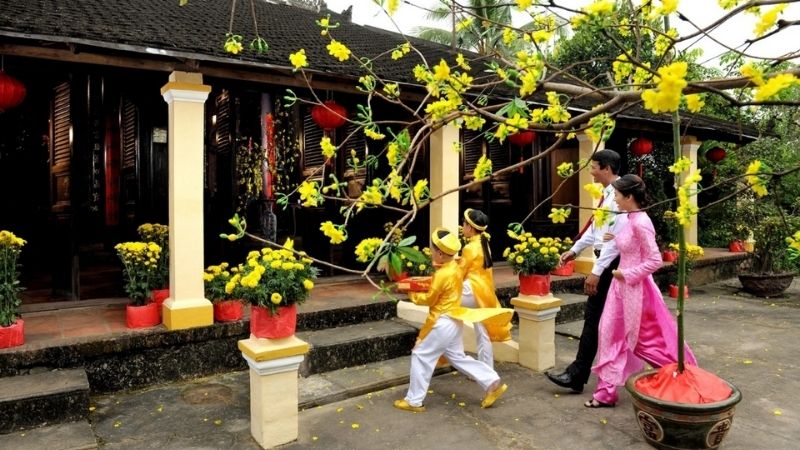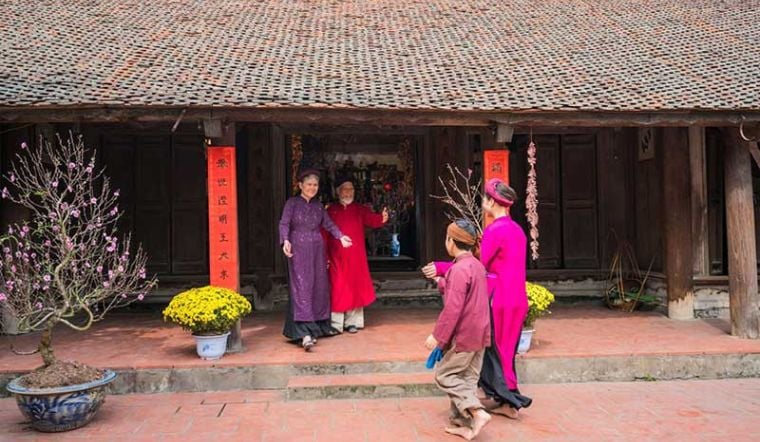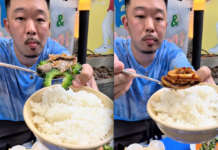What is ‘Xông đất’?
‘Xông đất’, also known as ‘đạp đất’ or ‘xông nhà’, is an age-old tradition in Vietnam. The ancient belief holds that the first person to visit and greet a family on the New Year will bring good fortune and prosperity for the entire year if their age is compatible with the host’s.
Thus, immediately after the New Year’s Eve, during the first moments of the New Year, the Vietnamese have long held the custom of “xông đất” in high regard.

The Significance of ‘Xông đất’
According to ancient beliefs, everything in the house is brand new after New Year’s Eve, so the host often wishes for someone to bring good luck, wealth, and prosperity to the family in the coming year. Therefore, the first guest is highly regarded.
This guest, who arrives on the morning of the first day of the year, is pre-arranged by the host and brings along fruits, cakes, and lucky money if there are children in the house. The host will warmly welcome them and happily accept their good wishes for the family.
The custom of visiting a house for ‘xông đất’ at the beginning of the year is a brief one, with the first guest staying for only about five to ten minutes, wishing the host’s family good fortune for the year.
This short visit brings joy and the belief that the family will be lucky for the rest of the year. Meanwhile, the guest who performs the ‘xông đất’ is happy to have spread good cheer and done a good deed to help others.
Which Age is Considered the Luckiest for ‘Xông đất’ in Giáp Thìn 2024?
According to Lao Động newspaper, feng shui expert Phạm Cương shared that the most suitable ages for ‘xông nhà’ and ‘xông đất’ in the upcoming Lunar New Year are those with the heavenly stem ‘Kỷ’ and the earthly branch ‘Dậu’. He also mentioned a few lucky ages, including: Kỷ Hợi (1959), Tân Dậu (1981), Kỷ Tỵ (1989), Kỷ Mão (1999), and Ất Dậu (2005).
Among these, the three luckiest ages are: Đinh Dậu (1957), Kỷ Dậu (1969), and Quý Dậu (1993).
Additionally, hosts should consider the compatibility between their age and that of the guest performing the ‘xông nhà’ to avoid any clashes. For instance, a host born in the year of the Rabbit should not invite someone born in the year of the Rooster, and a host born in the year of the Rat should avoid inviting someone born in the year of the Horse. Furthermore, hosts should ensure that the guest they invite to perform the ‘xông nhà’ or open their business for the year does not have any bereavements in their immediate family, to prevent any bad luck.
Mr. Cương stated, “We don’t need to be overly academic when choosing someone for ‘xông nhà’ or ‘xông đất’. Sometimes, in our lives, our close friends or relatives may not be compatible with us according to Eastern philosophy, but they share our values and outlook. They are our noble friends who, when visiting, create a warm, cheerful, united, and harmonious atmosphere during the New Year’s Eve and the beginning of the new year. This harmony attracts wealth, and as a result, we will have a prosperous and smooth year, attracting fortune.”

Superstitions to Avoid in the New Year
Don’t Sweep or Throw Out Garbage on the First Day of the Year
On the first day of the Lunar New Year, it is forbidden to touch a broom, as Vietnamese tradition holds that sweeping or throwing out garbage on this day sweeps away all the luck and prosperity for the coming year.
Furthermore, after sweeping, the broom must be hidden away. If the broom is lost on the first day of the year, it is considered a bad omen, signifying that thieves will rob the house of its wealth.
Don’t Lend Fire or Water to Others
In feng shui, fire symbolizes good luck, while water represents a constant flow of wealth into the home. Therefore, lending fire or water to others during the first days of the year means giving away your luck and prosperity. So, avoid lending lighters or giving water to anyone during these days.
Avoid Breaking Objects
Breaking objects is one of the superstitions to be avoided during the New Year.
Our ancestors believed that breaking plates, cups, glasses, or mirrors on the first day of the year foreshadowed separation and disharmony in relationships during the coming year.
Don’t Borrow or Lend Money
Borrowing or lending money during the New Year is believed to bring bad luck. It signifies a year of borrowing and repaying, leading to financial hardship and scarcity. Moreover, lending money during this time is seen as giving away your luck and prosperity to others. So, remember not to borrow or lend money during the New Year celebrations.
Avoid Speaking Ill or Using Profanity
Words spoken during the New Year must be chosen carefully, as only good fortune is desired. Therefore, ill-omened words or profanity, even in jest, must not be uttered.
Similarly, certain foods with negative connotations, such as shrimp, balut, dog meat, duck, and mackerel, among others, must not be consumed during these days, as they are believed to bring bad luck for the coming year, according to ancient beliefs.







































